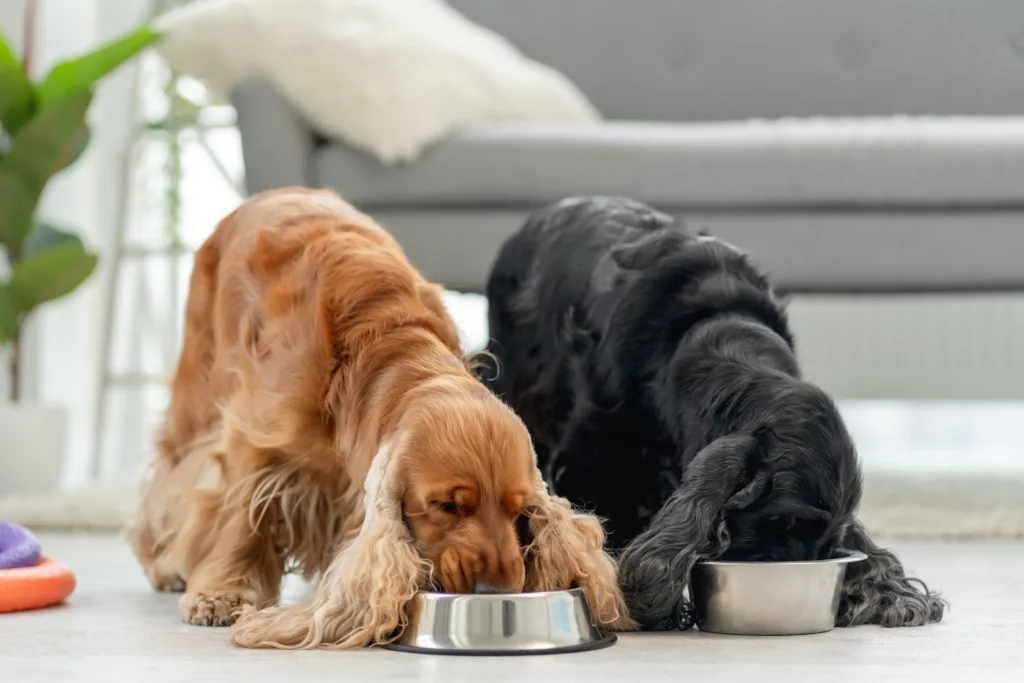Monday - Friday: 9:00 - 19:00
How many times have I heard that? The family convinced that being overweight harms their animal's health and believing they are doing well by choosing light food, nevertheless worsened the situation.
Let’s look at the most classic reasons for weight variation (apart from any medical cause):
The European Pet Food Industry Federation (FEDIAF) has established a “Code of Good Practice for Labelling Pet Food". A product can be declared "light" if its energy value is at least 15 % lower than a standard maintenance product of the same brand. So, by choosing the new diet within the same brand and range and not increasing the amounts distributed, the calorie restriction will be at least 15%. It may prevent weight gain or even result in slight weight loss.
The package does not indicate energy density because its declaration is optional. So, what should you do? The simplest way is to find this value on the manufacturer's or seller's website. If it is available, it is written in the "composition" tab and the "analytical components", generally under the name " metabolisable energy", expressed in kcal/100 g. The other option is to call the consumer line and ask the question.
TAKE-HOME MESSAGE: "Light" doesn't necessarily mean low in calories when it comes to food. The nutritional content can vary significantly between different brands.

Suppose your dog does not lose weight or is still hungry after one or two attempts. In that case, selecting an appropriate weight loss nutrition plan is recommended instead of struggling with unsatisfactory outcomes and feeling guilty for your pet. This way, you can avoid discouragement and ensure your pet's well-being.
When adult dogs put on weight without any change in physical activity, it is primarily due to increased fat mass, also known as adipose tissue. This tissue stores energy for the body and requires very little energy for its own needs, only a few kcals per kg of tissue, unlike lean mass such as muscles and organs. In other words, adipose tissue is a cost-effective energy storage that can be accessed when needed.
On the label, the recommended amount of food for adult dogs is based on body weight. It is not designed to consider the dog's body composition, such as lean mass, adipose tissue, and bone mass. For example, if a dog is 2 kg overweight, with most of that weight being fatty tissue, the current recommendations will calculate that extra weight as muscle, which requires more energy. This can cause overweight dogs to consume extra calories, leading to further weight gain.
TAKE-HOME MESSAGE: To determine the appropriate daily food quantity for your dog from the packaging, it's essential to use their optimal weight instead of their current body weight, especially if they are overweight.
But how do you estimate your dog's optimal weight? The easiest way is to have your veterinarian assess their weight and body condition during each check-up visit.
The recommendations on a pack of kibble or wet food are guidelines: They are calculated based on a typical dog with average activity levels without considering the dog's genetics or environment. Occasionally, the recommendations may be found on the dog's activity level, but it can be challenging to quantify your dog's activity accurately.
The most straightforward approach would be to communicate with your veterinarian or seek advice from a specialist in nutrition for pets.
TAKE-HOME MESSAGE: The suggested food portions on the packaging are designed for an average dog. It is essential to tailor the diet to meet any specific dietary needs of your pet.
dog, food balance, gain weight, individualized, individualized nutrition, individualized nutrition, light food, light food, Nutrition, optimal weight, ration, specialist, Veterinary
Our team is dedicated to providing you and your pets with the best care possible. Our modern facilities include a laboratory, ultrasound, surgical block with monitoring and gas anaesthesia, and day hospitalisation area.
Our staff values transparency, information, and compassionate care at Madeleine Vet. If you have any questions or need more information, please don't hesitate to ask.

©2023 Madeleine Vet, All rights reserved. Site created with love by Boca